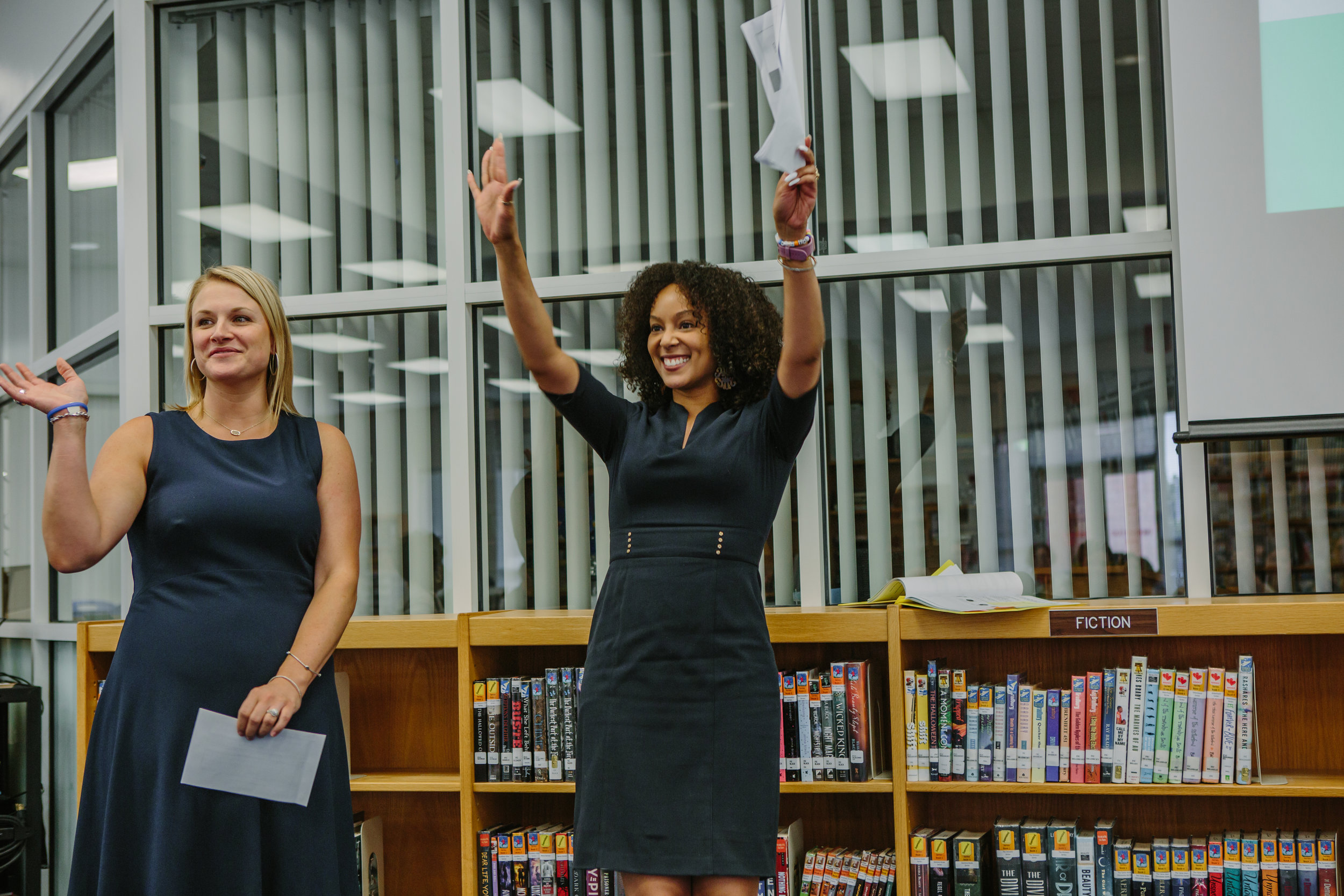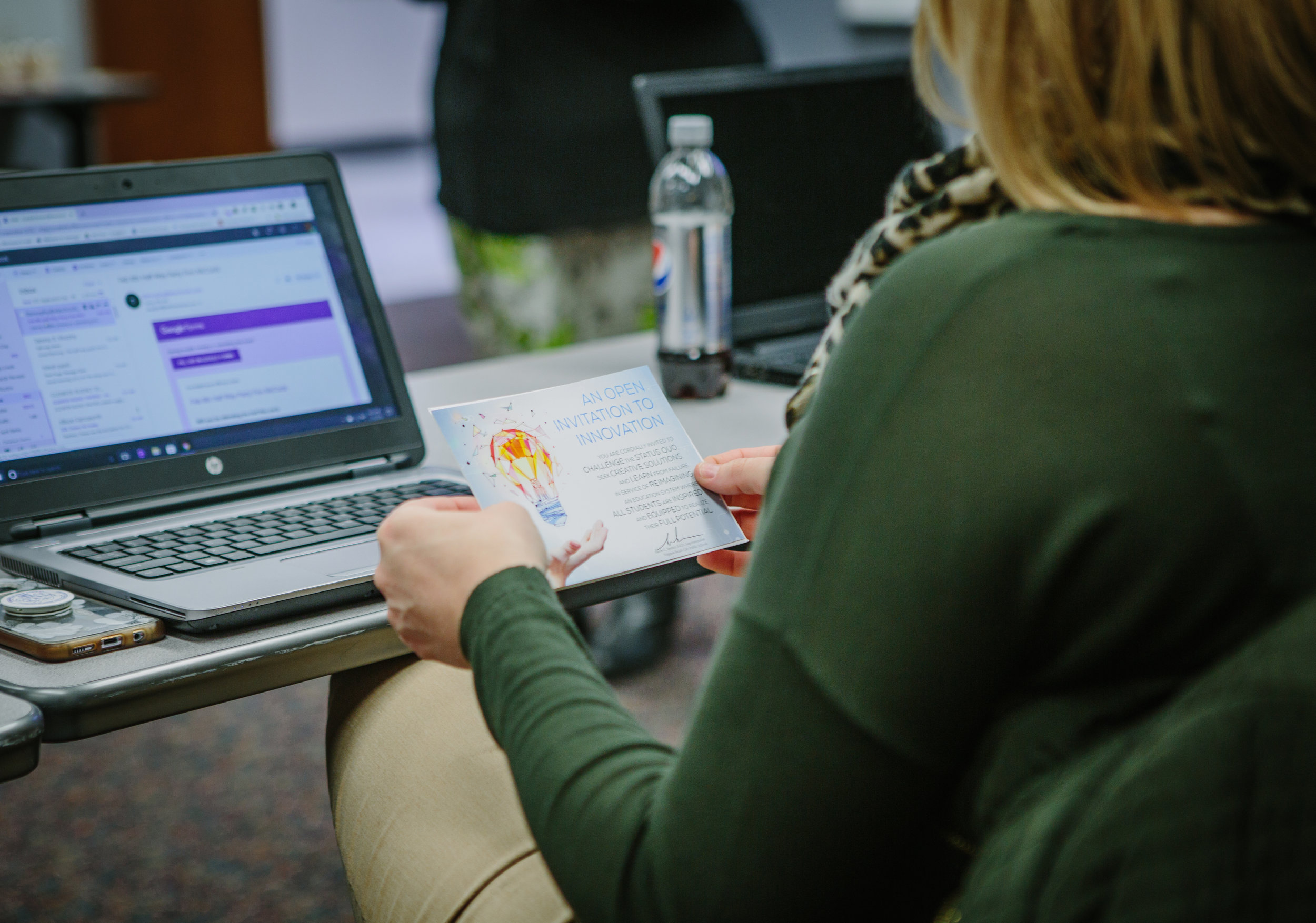Micah B. Harris, Principal of Malibu Elementary School
What has been most meaningful for you in this process?
One of the things that stands out [about this experience] is the ability to connect with other educators and community members in the Division. We have a lot of opportunities in our school building to do that, and when we have citywide opportunities to connect with our peers it’s typically our own peer group, like principal to principal. Here it’s a mixed group. We get to engage with people from different buildings and different roles: high school people, elementary school staff, parents. Hearing a high school teacher’s perspective — that’s something I wouldn’t have an opportunity to do — so that’s been eye-opening.
What is your why for being here? Why did you sign up?
I wanted to be on the cutting edge of discussions about the city. I wanted to be in on the conversation and I was intrigued by design thinking. This seemed like a great opportunity to jump on.
How is this work different from what you expected?
I don’t think that I expected as much free-range. I don’t mean it in a bad way; I am learning how this prototyping process works. You conceptualize and try it. The failing-forward mindset gives a wide berth for creativity. I expected a little more prescriptive experience, where it was more like: “Do this, then do that.” I am a pragmatist. I am a little cautious. [When we started], I was like, “I’m a nerd, I’m going to research first instead of just taking a risk and trying something”...but that isn’t exactly how this works.
The work has made me a little more tolerant with myself when it comes to the redesign process. I have always been a strong reflective practitioner. I think when you combine a reflective practitioner with a high achiever you reflect on your failures and you get really frustrated and you get hard on yourself. You think of all the negatives. You learned so much in that moment, and you might have had 99 successes and one mistake. Old me would be focusing in on, “Oh my gosh that one mistake.” Post-design thinking, I am thinking of it as an opportunity to redesign and try again. I think it shifted my attitude — finding out that it’s normal to fail. It means you are making progress. It’s the first time I owned that.
For example, one of the prototypes we have been working on is to try a parent shadow day to bridge the school and community and show what transformational learning looks like and educate parents. I put a lot of time into designing it. I brought in stakeholders to brainstorm. I had staff members rearrange their day for it, and one parent showed up. Statistically that would be considered a failure. Rachel [Lopkin], from 2Rev, on the other hand, was like, “Yay ONE person!” It shifts how you look at it. It takes a team, it takes a coach. Rachel is a “warm demander.” You can totally tell her, “The buildings on fire, and there’s a tornado, and there’s famine.” And she would say, “At least you are still standing, keep going! We are going to keep pushing forward.”
What’s your biggest learning?
I think the fact that you can make so many prototypes. Typically, when we plan an event, for example, a professional development day, if you are prototyping, you can make a few [iterations] and try until one works, but I don’t think that’s our natural inclination. When we tried the parent event prototype, the coaches told us: Try one more, try another, try during the day, etc. They were getting us to think about different models. Instead of, “Oh man, it didn’t work. Better luck next year.” Prototypes are not just one idea or concept that you marry yourself to.
Would you engage in something like this again?
I think I would. Of course the conditions would have to be right, the timing, and level of commitment.
What could be improved?
To be frank it’s my first experience like this, so it’s hard in my case to say. I have seen a lot of flexibility on the part of Virginia Beach and 2Rev. They have been really intentional about being flexible with our timing. Letting us set up group meetings on our own. Nobody is using shame or guilt on us. They honor that we are all working professionals; everyone is being mindful of that.
Can you describe your prototype?
Our group was on the parent side of transforming mindset. We were looking at the problem statement of: how do we better educate and engage parents? The education piece we lamented that we’re seeing school and citywide is that it’s hard to get parents to come out to learn about education, and at the same time everyone has a vote and voice in educational policy. The Division has put so much out for families, [but it’s a question of whether people find it].
For me, as a school principal, one element of my role is to engage stakeholders. So this is already a requirement for my job, so I was thinking about how can I transform it to make the experience different, and create a parent shadow day where parents go on a true learning walk. The idea is that during the transformational learning walk, parents have the opportunity to come into the building and go into classrooms and take notes and talk about what learning looks in 2019. They would learn about concepts like flexible grouping structures, technology integration, and then connect it to the graduate profile and talk about how do we make school future ready. Parents were able to do an activity that students do every day.
Lisa Banicky, the executive director of Planning, Innovation, and Accountability at Virginia Beach City Public Schools, gave each of the participants in the prototyping process a special invitation to innovate. A statement like this meant a lot to participants, like Harris, who felt it opened up the doors to the risks and rewards innovation brings to a district.
I think the experience blew up their schemas of what school used to be. Everyone has an opinion [about school] because everyone has been to school. How often do they really get to see what school is?
I gave a survey before they left the learning walk and they rated their experience. We also did an activity called, “I like…I wish…I wonder” and I recorded their thoughts there as well. I think this should be done more often across the Division; there’s so much hands-on learning. I hope I can do it again.
What was the most positive part of this experience?
I loved when Dr. [Lisa] Banicky, the Division’s executive director of planning, innovation, and accountability, gave us an invitation to innovate. I thought that was so clever. It was something small, but it really stood out. It’s so simple, but so profound. Of course she put it in envelopes and the delivery was something. It was metaphorical and it was what we needed; just really thoughtful. That kind of rocked my world.


